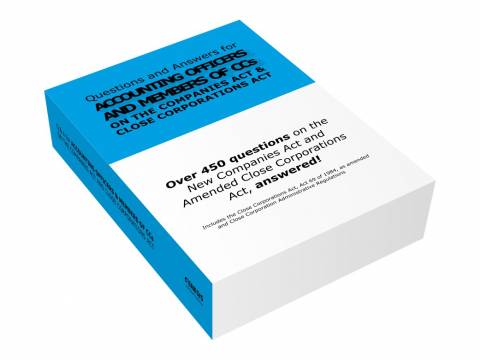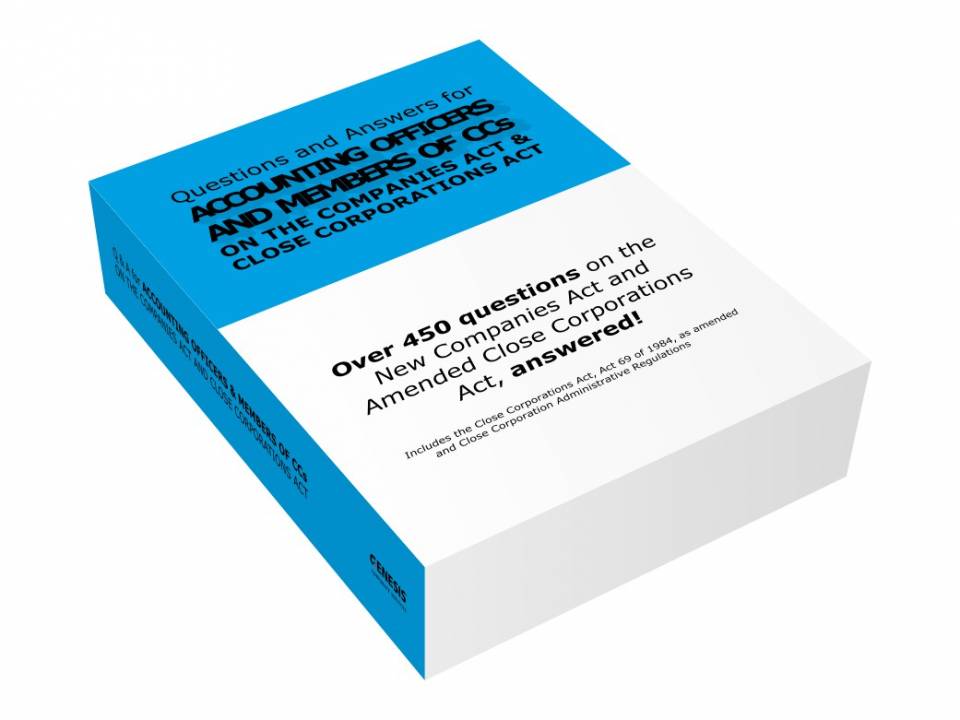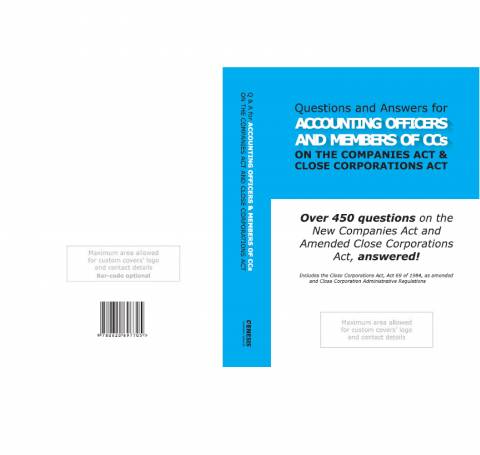Questions and Answers on Close Corporations including Accounting Officers and Members of CCs on the Companies Act and Amended CC Act
R
545.00
( R473.91 Excl VAT )
Cover
- Plain cover
- Your cover
Bulk Discounts
- Save R 30.00! R 515.00 (R 447.83 Excl VAT) unit cost, on quantity 10 or more
Shipping
- 20% of unit cost Courier: 20% of unit cost, with quantity 1 or more
- R 0.00 per unit Collection: R 0.00 per unit, for quantity 1 or more
Practical answers and explanations to a selection of over 450 questions on Close Corporations around the Amended Close Corporations Act and New Companies Act for Accounting Officers and Members of CCs
SOME SELECTED QUESTIONS FROM THE BOOK
- What is meant by a “member’s interest” in a close corporation?
- Who may be a member of a close corporation?
- What are the new responsibilities of close corporations in terms of Schedule 3 of Companies Act 2008?
- Who must sign the amended Founding Statement of an existing close corporation?
- May the amended Founding Statement of an existing close corporation contain a shortened form of the name of that close corporation?
- When must form CK2 (amended Founding Statement) be lodged?
- May a creditor of an existing close corporation make application to the Commission to serve a reminder on the members of the corporation to lodge an amended Founding Statement?
- What are the differences between private companies and close corporations?
- When does a person control a close corporation?
- How does one confirm if a close corporation is still “in business”?
- May a close corporation whose shares are held by a trust be owner-managed in terms of section 30(2A) of Companies Act 2008?
- May a close corporation be considered to be an owner-managed corporation if one of the members is a trust despite all of the trustees being members?
- Does Close Corporations Act 1984 or Companies Act 2008 require from a close corporation to place the names of its members on the corporation’s letterhead? If so, which information must be stated on the letterhead of a close corporation?
- What are the new provisions of Close Corporations Act 1984 relating to the criteria for the names of existing close corporations?
- For how long may a name reservation of an existing close corporation continue?
- May a trading name also be reflected on the close corporation’s forms?
- Does a change in the name of an existing close corporation affect an obligation of the corporation instituted against the corporation?
- When does the membership of a member of a close corporation commence?
- Under what circumstances may a natural person qualify for membership of an existing close corporation?
- When shall a natural person qualify for membership of an existing close corporation?
- May two persons be the joint holders of the same member’s interest in an existing close corporation?
- What are the requirements relating to contributions by the members of a close corporation?
- May a minor be a member of a close corporation?
- May the trustee of the insolvent estate of a member of a close corporation sell the member’s interest to a person who is not a member of the close corporation but who qualifies for membership?
- May the executor of the estate of a deceased member of a close corporation sell the deceased member’s interest to a person who is not a member of the close corporation, but who qualifies for membership?
- Which are the matters that may be regulated by the Association Agreement?
- May an existing close corporation give financial assistance for the acquisition of a member’s interest in that corporation by means of the provision of security?
- Is a member of a close corporation entitled to a distribution of the net income of that close corporation?
- A close corporation is prohibited to make loans and furnish security to certain specified persons as contemplated in Close Corporations Act 1984. Who are these persons?
- What are the rules which govern payments to members of a close corporation to ensure the close corporation maintains being solvent and liquid?
- Is a new member of a close corporation bound to an existing Association Agreement even if he has not signed it?
- Which matters require a 100% consent vote by the members of a close corporation?
- Do all members of a close corporation have equal rights in regards to the management of the business of a corporation?
- Does a close corporation have the capacity and powers of a natural person?
- What is the percentage threshold of members to constitute a quorum for a members’ meeting?
- May a member of a close corporation be compelled to purchase the interest of another member of that close corporation?
- How do the standards of conduct of members of a close corporation differ from the standards of conduct of directors and prescribed officers of a company?
- Under what circumstances is a past member of a close corporation liable to the corporation for any repayment received by him which has been paid by that corporation?
- How do the liabilities of members of a close corporation differ from the liabilities of directors and prescribed officers of a company?
- In which three instances must a close corporation meet the solvency and liquidity test?
- How does the application of the solvency and liquidity test to a close corporation differ from the application of the test to a company?
- What is meant by the “fiduciary relationship” of members of a close corporation?
- How does the fiduciary position of members in a close corporation differ from their duties of care and skill?
- Which are the main provisions of Close Corporations Act 1984 giving rise to personal liability of members of a close corporation?
- When does a close corporation trade recklessly?
- Who qualifies to act as an accounting officer of a close corporation?
- What are the procedural requirements to appoint an accounting officer of a corporation in his personal capacity?
- Does a member of a close corporation qualify for appointment as the accounting officer of that corporation?
- Does a firm whose partner is a member of a close corporation qualify for appointment as the accounting officer of that close corporation?
- Is the accounting officer of a close corporation under a duty to disclose in his report to a close corporation that he is an employee of that corporation?
- May an accounting officer carry out the independent review of the annual financial statements of a company?
- The appointment of an auditor of a close corporation is a statutory requirement in certain circumstances. What are these circumstances?
- Is it a reportable irregularity under Companies Act 2008 if the liabilities of a close corporation exceed its assets?
- What are the differences in the financial year of a close corporation in comparison with the financial year of a company?
- What does the accounting records of a close corporation include?
- What are the retention periods of close corporation records?
- What is the difference in the application of the business judgement rule in terms of a close corporation as opposed to a company in relation to accounting records and financial statements?
- How is the public interest score calculated for a profit company, a non-profit company and a close corporation?
- Under which circumstances is it compulsory for a close corporation to have a social and ethics committee (SECOM)?
- Under what circumstances must the annual financial statements of a close corporation be audited?
- Under what circumstances must the annual financial statements of a close corporation be independently reviewed?
- What are the steps to submit the financial accountability supplement of a close corporation to the Commission?
- Is it a reportable irregularity in terms of Companies Act 2008 if a close corporation trades under insolvent conditions?
- Which information has to be submitted with the close corporation’s annual return?
- A member of a close corporation has eight statutory fiduciary duties to the corporation. What are these duties?
- Under which circumstances is a member of a close corporation liable for the repayment of a salary or other remuneration paid to him by the corporation?
- Is a former member of a close corporation liable to the corporation on account of his breach of fiduciary duties to the corporation?
- What are the steps for the finalisation of the liquidation process of a close corporation?
- What are the differences between a members’ and a creditors’ liquidation?
- What are the steps to deregister a close corporation?
- How does one restore a close corporation which has been deregistered?
- May a third party object to the deregistration of a close corporation?
- On what grounds may the Commission apply to a court for an order to wind-up a solvent close corporation and deregister that corporation?
- What procedures must be followed by a member of a solvent corporation to prevent a court from ordering that corporation to be wound-up and be deregistered by the Commission?
- Under what circumstances should a close corporation be converted to a private company?
- May a close corporation convert to a non-profit company?
- May a close corporation convert to a personal liability company?
- May a close corporation convert to a public company?
- What are the steps to convert a close corporation to a private profit company?
- What happens to the accounting officer of a close corporation which has been converted to a company?
- PLUS the Integrated and Consolidated Close Corporations Act, 1984 as amended by the Close Corporations Amendment Act, 2005, Corporate Laws Amendment Act, 2006 and Companies Act 2008 and also includes the Close Corporation Administrative Regulations
Specifications
| Over 450 Questions and Answers | |
| A5 Size | |
| ~ 630 Pages | |
| Includes the Integrated and Consolidated Close Corporations Act 1984, as amended and Close Corporation Administrative Regulations |


